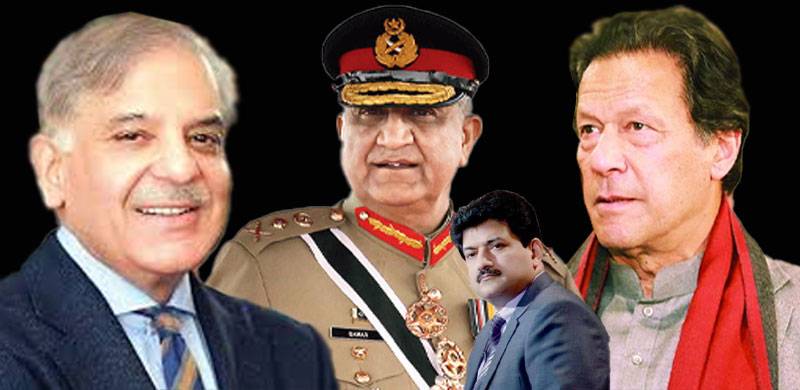
Whether anyone agrees or not, the current political standoff is all about the appointment of the next Army Chief. It started when PTI chairman Imran Khan was still in office. The Pakistan Tehreek-e-Insaf (PTI) chairman had granted a three-year extension in term to Chief of the Army Staff (COAS) General Qamar Javed Bajwa, but once he developed differences with him over the transfer of Inter-Services Intelligence (ISI) Director-General, he decided to dismiss him early and appoint a loyalist for the job.
It isn’t a secret anymore that Imran wanted to use the military for his political gains. When the army refused to be used in the name of its constitutional limitations, Khan became furious.
The former premier tried to negotiate a deal with Gen Bajwa after the no-trust motion came to the parliament, but it failed.
Once ousted from power, he once again attempted to ink an agreement with the COAS via President Dr. Arif Alvi, but to no avail. It was at this time when he began to directly criticize Gen Bajwa and some other officers.
When the PTI chairman was fired upon on November 3 during a political rally in Wazirabad, he leveled serious accusations at a military officer, and talked about the difficulties he was facing to have a First Information Report (FIR) of the incident registered. The Inter-Services Public Relations (ISPR), the media wing of the armed forces, sternly rejected the assertion against one of its officers.
What followed was an emotional presser by PTI senator Azam Swati, but his revelations weren’t new. We all know how Asif Ali Zardari, Shehbaz Sharif, Maryam Nawaz and some other politicians were filmed when Imran Khan was at the helm.
Justice should be delivered, but it is ironic that when some PTI leaders were dragging selected army men into the scandal, some of Imran’s close aides were trying to reach out to certain military officers to find ways to reconcile.
There’s nothing wrong with trying to reconcile or wanting fresh elections, but it is extremely inappropriate to want the outgoing COAS to name a certain officer to lead the armed forces to “make things right”.
This shows that our popular political leadership relies more on the army chief than it relies on the people, and it wasn’t just Imran Khan but also other premiers who set aside seniority to appoint a COAS of their choice. Unsurprisingly, none of them got what they wanted after they had the man that they wanted in the GHQ.
Pakistan’s first premier Liaquat Ali Khan set aside two senior generals, Muhammad Akbar Khan and NMA Raza to appoint Gen Ayub Khan as the chief of the armed forces. Gen Akbar Khan’s book Meri Akhri Manzil details the conspiracies prior to the appointment of the first army chief of the country.
Senior-most and capable officer Gen Iftikhar Khan suddenly became victim to a mysterious air accident. The aforesaid generals were ignored because they opposed appointing a British officer as the commander of Pakistan’s military. Acting upon the advice of secretary defense Iskander Mirza, Liaquat Ali Khan put Ayub Khan at the helm.
The same Ayub Khan then colluded with Mirza to impose the first martial law in Pakistan. In 1958, when he became the president, he set aside seniority of three generals to appoint Moosa Khan as the COAS. He did the same in 1966 when he ignored the seniority of two generals to choose Yahya Khan.
Yahya was the one who oversaw Ayub’s resignation before imposing a second martial law.
In 1976, Zulfiqar Ali Bhutto, another populist premier made Zia-ul-Haq the army chief, setting aside seniority of no less than seven officers. But the same man imposed martial law in 1977, and in 1979, he played a major role in sending Bhutto to the gallows.
The same happened several times under Nawaz Sharif’s premiership. He chose Gen Pervez Musharraf in 1998, setting aside two senior officers in the process. He paid the price within a year, with the general taking over.
In 2013, Nawaz once again set aside two generals to appoint Gen Raheel Sharif for the top slot. It is believed that Gen Sharif at one instance was planning to impose a martial law but didn’t after he was advised by some fellow officers against it.
Three years later, in 2016, Nawaz appointed Gen Qamar Javed Bajwa by setting aside seniority of four officers. A year later, he was on the GT road talking about the infamous ‘khalai makhlooq’.
In 2019, then premier Imran Khan, London-based Nawaz and NAB-prisoner Asif Ali Zardari reached a ‘historic’ consensus to extend Gen Bajwa’s term in service. When the top court inquired about the law that allowed it, the politicians huddled at the parliament to pass a law, and silenced the judiciary.
The same Gen Bajwa whose term was extened by Imran Khan is today being projected as some kind of a villain. In Pakistan, unfortunately, an army chief is deemed more powerful than a president or a prime minister and that is why every premier wants a military chief of their personal choice. Why can’t this appointment be made purely on merit?
Had Imran Khan taken care of merit in 2019, he wouldn’t be in a hospital, telling the world about the failure to register an FIR.
Translated from Hamid Mir’s article published in Jang digital

